 I have started re-reading Security Analysis, 6th edition, (also will add on things from the 5th ed). I have been putting it on the backburner for sometime, but since the last time I read this was about 14 years back, decided that I have changed too much not to re-read this once more. Hoping to learn a lot more the second time around.
I have started re-reading Security Analysis, 6th edition, (also will add on things from the 5th ed). I have been putting it on the backburner for sometime, but since the last time I read this was about 14 years back, decided that I have changed too much not to re-read this once more. Hoping to learn a lot more the second time around.From the preface to the 6th edition by Seth Klarman
Value investing is not a paint-by-numbers exercise. Skepticism and judgment are always required. For one thing, not all elements affecting value are captured in a company’s financial statements—inventories can grow obsolete and receivables uncollectable; liabilities are sometimes unrecorded and property values over - or understated. Second, valuation is an art, not a science. Because the value of a business depends on numerous variables, it can typically be assessed only within a range. Third, the outcomes of all investments depend to some extent on the future, which cannot be predicted with certainty; for this reason, even some carefully analyzed investments fail to achieve profitable outcomes.
It is not enough just to number crunch. A business participates in a complex adaptive system, which is continuously in a flux. We need to be able to understand businesses and their operating environments; political, economic and social environments are also important to be understood.
While bargains still occasionally hide in plain sight, securities today are most likely to become mispriced when they are either accidentally overlooked or deliberately avoided.
Before buying, it is important to ask the question, why is this cheap?
When bargains are scarce, value investors must be patient; compromising standards is a slippery slope to disaster. New opportunities will emerge, even if we don’t know when or where. In the absence of compelling opportunity, holding at least a portion of one’s portfolio in cash equivalents (for example, U.S. Treasury bills) awaiting future deployment will sometimes be the most sensible option. -- This is a difficult thing to do emotionally, especially in a rising market.
Like Klarman says, this is a very very difficult thing to practice. In a rising market, most value investors get out too early, which in itself is not a bad thing, but tests ones patience and fortitude immensely, to see ones friends keep making money when one is out of the market, sitting on cash.
Even in an expensive market, value investors must keep analyzing securities and assessing businesses, gaining knowledge and experience that will be useful in the future.
Keep sharpening your saw or as Peter Lynch has said, keep turning over as many rocks as possible. I think it is important to study business in a pattern to get the most benefit. I like to look at a particular industry and multiple stocks within it.
Selling is more difficult because it involves securities that are closer to fully priced. As with buying, investors need a discipline for selling. **First, sell targets, once set, should be regularly adjusted to reflect all currently available information.** Second, individual investors must consider tax consequences. Third, whether or not an investor is fully invested may influence the urgency of raising cash from a stockholding as it approaches full valuation. The availability of better bargains might also make one a more eager seller. Finally, value investors should completely exit a security by the time it reaches full value; owning overvalued securities is the realm of speculators.
For stocks which are compounding machines, we need to keep updating the intrinsic value, so that we do not get out of them too early. On the other hand, a sense of what a stock is worth is a must at all times for all stocks in one's portfolio.

Excellent post. When it is fully valued we need to get out is the biggest area of doubt.In a raging bull market like the present one overall valuation of the sector moves up and so individual stocks.So personal views on valuation or historical numbers may be incorrect.Claiming the scrip is fully valued now is a very subjective exercise.How does one goes about it ? Same question on the compounding machines.Classic example Gruh Finance.Everytime we see it as fully valued and it keeps moving up.In my opinion valuation is also a relative exercise when the market pays huge premium to consistent performers (scarcity premium).Would like to know your thoughts
ReplyDeleteThis comment has been removed by a blog administrator.
ReplyDeleteDear Sir your comment on techno electrical results...
ReplyDeleteThis comment has been removed by a blog administrator.
ReplyDelete